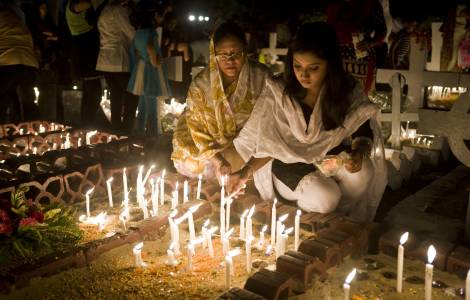
Dhaka (Agenzia Fides) - In the place in Dhaka, where terrorists on July 1 killed 22 people, someone brought flowers, including an unnamed wreath, with two words on the ribbon: "Forgive us". "I think that it expresses the dominant feeling, or however very intense feeling, which pervades many Bangladeshis after the massacre. Disbelief, fear, concern for themselves and for the country, and also the feeling that those young have also harrassed Bangladesh and the image it has of itself. The perception of reality is now different, and full of discomfort: we are capable of this": says Fr. Franco Cagnasso, PIME missionary in Bangladesh, reflecting on the situation after the massacre.
The missionary, who writes a blog titled "Splinters of Bengal", recalls the young Faraaz Ayaaz Hossain, kidnapped by the terrorists along with others, then released because he had learned to recite parts of the Koran. "He could have left, but he remained to share the fate of two friends, withheld because dressed in a Western manner, and was killed with them. He was Bengali, and a Muslim. His choice is almost a balm that softens the anguish for the atrocities we are witnessing", the missionary said.
Fr. Cagnasso’s analysis cites the phenomenon of madrassas (Koranic schools), incubators of hatred and violence, but also remembers that the terrorists were from wealthy families, who did not study in madrasas, but in prestigious private and international universities. According to local sources, there are about 300 university students and young graduates who have disappeared in the last year and who may be among the new members of high-level cultural radicals. "All the more radical forms of totalitarian and violent ideologies, in every time and in every country, have had educated people, with a lot of bad teachers in the university world. And then there is the Internet factor that unfortunately opened the doors to the dangers of telefanatism, fanaticism spread by air", he concludes, pointing to the three key elements to understand the phenomenon of terrorism in Bangladesh: madrasas, universities, Internet. (PA) (Agenzia Fides 12/07/2016)